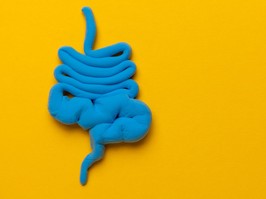study may have solved the mystery of ibs trigger foods
researchers pinpointed the mechanism that connects specific foods with the activation of histamine-producing cells.

ibs symptoms include abdominal pain, constipation and diarrhea.
getty
researchers have just discovered the biological mechanism behind irritable bowel syndrome, relieving news for the hundreds of millions of people tired of the way food-induced abdominal pain constantly cramps their style.the study, conducted at the ku leuven research university in belgium, could hold the key to improving the quality of life for people who have found certain foods cause their digestive system to liquidate its assets, despite not having any known allergies or other underlying conditions that could be to blame. the symptoms, which include a maddening mix of abdominal pain, diarrhea and constipation, also takes a steep mental toll on sufferers.“very often these patients are not taken seriously by physicians and the lack of an allergic response is used as an argument that this is all in the mind and that they don’t have a problem with their gut physiology,” said guy boeckxstaens, the lead author and a gastroenterologist at ku leuven, according to live science. “with these new insights, we provide further evidence that we are dealing with a real disease.”previous work by boeckxstaens and his team determined that blocking histamine — an integral component of the body’s immune system — has a beneficial effect on the condition of people with ibs. the new study goes further, actually pinpointing the mechanism that connects specific foods with the activation of histamine-producing cells, known as mast cells.because immune systems do not typically react to food in healthy intestines, boeckxstaens’ team focused on factors that can compromise this tolerance. recognizing patients often report a gastrointestinal infection — such as food poisoning — as a precursor to their unsettling symptoms, researchers theorized that the specific food present in the gut at the time of infection might make the immune system sensitive to that item.to test this theory, researchers infected mice with a stomach bug at the same time they gave them ovalbumin, the main protein found in egg whites. once the mice recovered from the infection, they gave them ovalbumin again and found it provoked a similar response from the immune system, causing mast cells to release histamine that prompted intolerance and pain in the digestive system. they also noted this immune response only occurred in the specific area of the intestines that was subject to the infection, suggesting there exists a range of food-related immune diseases.“at one end of the spectrum, the immune response to a food antigen is very local, as in ibs,” boeckxstaens said. “at the other end of the spectrum is food allergy, comprising a generalized condition of severe mast cell activation, with an impact on breathing, blood pressure and so on.”the researchers then tested their findings on humans by injecting antigens connected to ibs, such as wheat, gluten, soy and cow milk, into the intestine walls of a dozen patients with the disease. it produced the same localized immune reaction seen in mice — a reaction that did not occur in participants without ibs. “this is further proof that the mechanism we have unravelled has clinical relevance,” boeckxstaens said.because of the small sample size used in this research, a larger study using anti-histamines to combat ibs is already underway to confirm its findings. “but knowing the mechanism that leads to mast cell activation is crucial and will lead to novel therapies for these patients,” boeckxstaens said. “mast cells release many more compounds and mediators than just histamine, so if you can block the activation of these cells, i believe you will have a much more efficient therapy.”dave yasvinski is a writer with healthing.cadon’t miss the latest 世界杯决赛2022. subscribe to healthing’s daily newsletter.
 3 minute read
3 minute read





